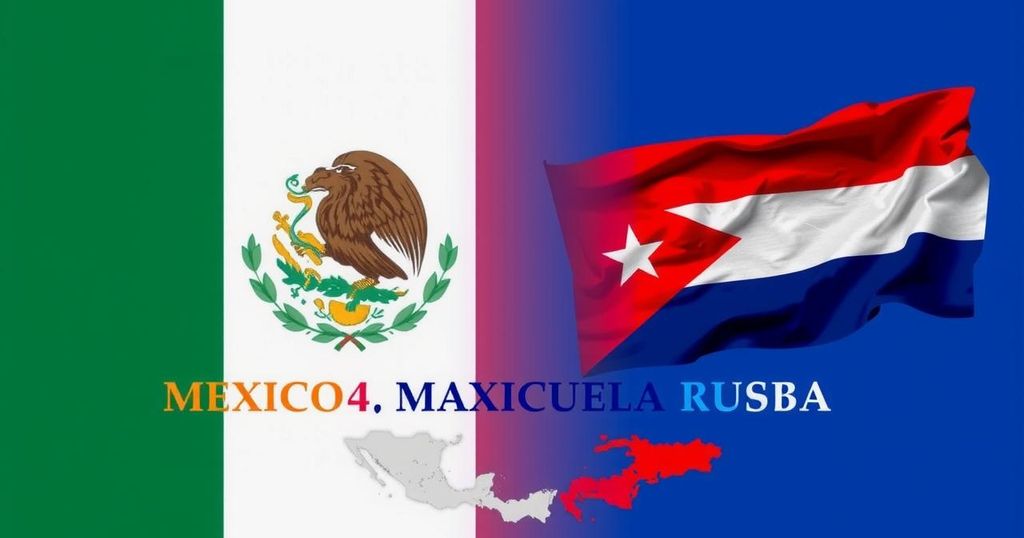Global news
AMERICAS, ANDRES MANUEL LOPEZ OBRADOR, ANDRÉS MANUEL LÓPEZ OBRADOR, ASIA, CLAUDIA SHEINBAUM, CUBA, DIPLOMATIC RELATIONS, HUGO CHAVEZ, INTERNATIONAL RELATIONS, MEXICO, NICARAGUA, NORTH AMERICA, PHILIPPINES, SANCTIONS, SHE, SHEINBAUM, SOUTH AMERICA, SOVIET UNION, TRADE RELATIONS, VENEZUELA
Fatima Khan
0 Comments
Mexico’s Troubling Alliance with Cuba’s Dictatorship
Mexico has become an unlikely supporter of Cuba’s long-standing dictatorship, stepping into a role once filled by the Soviet Union and Venezuela. Over recent years, Mexico has committed substantial resources to aid Cuba, including millions of barrels of oil, while domestic violence and crime surge. This support raises questions about Mexico’s dedication to democratic values and human rights amid catastrophic management of both countries’ socio-economic issues.
Mexico has emerged as a surprising supporter of Cuba’s longstanding dictatorship, marking a shift reminiscent of past alliances formed during the Soviet era. For approximately three decades, the Soviet Union significantly bolstered the Cuban regime with more than $29 billion in resources, while in the 1990s, Venezuela ascended as a crucial benefactor under Hugo Chávez, contributing over $35 billion predominantly in oil. However, as Venezuela’s situation deteriorates, Mexico has stepped in as the new benefactor, supplying Cuba with essential commodities, particularly oil and food, in an attempt to sustain the failing communist state. The Mexican government’s foreign diplomacy has raised eyebrows, particularly as it appears to prioritize support for Cuba over pressing domestic concerns, which include rampant violence and crime. Notably, in 2023, the then-President Andrés Manuel López Obrador committed to an unprecedented shipment of 5.4 million barrels of oil to Cuba, reinforcing Mexico’s role as a vital partner for the Cuban government, which has suffered from economic mismanagement and human rights abuses for over six decades. President Claudia Sheinbaum’s administration has further entrenched this support, not only extending material aid to Cuba but also overshadowing the grave realities faced in Mexico. The country’s struggle against violence has been evident, yet the prioritization of support for the Cuban government stands in stark contrast to the urgent needs of the Mexican populace. Moreover, Sheinbaum’s declarations of solidarity with Cuba have raised questions about Mexico’s alignment with democratic principles and humanitarian values. Despite the economic investments made in Cuba, the assistance offered appears to serve the interests of the dictatorship rather than the Cuban people, with no significant conditions placed on the aid that would prompt political reform or the release of political prisoners. The lack of transparent management in the bilateral relations also indicates possible ulterior motives and a concerning alignment with authoritarian governance.
The article delves into the implications of Mexico’s support for Cuba’s dictatorship amid its historical ties to other oppressive regimes in latin america. Highlighting how external support has historically bolstered Cuba’s communist regime, it discusses the transition from Soviet to Venezuelan funding, ultimately leading to Mexico’s current role as a supplier of essential resources. It contextualizes the political and economic desperation in Cuba, juxtaposed against the aggressive crackdown on civil liberties and dissent, while examining how Mexico’s foreign policy decisions impact both nations’ domestic and international standing.
In summary, Mexico’s evolving relationship with Cuba illustrates a troubling departure from democratic values and human rights advocacy. The Mexican government’s extensive support for the Cuban regime, marked by substantial oil shipments and food aid, raises critical concerns about its commitment to the welfare of its citizens and adherence to democratic principles. The prioritization of support for a dictatorship over pressing domestic challenges and human rights abuses suggests a concerning trajectory for Mexico’s political landscape, further complicating its role on the global stage.
Original Source: thehill.com




Post Comment